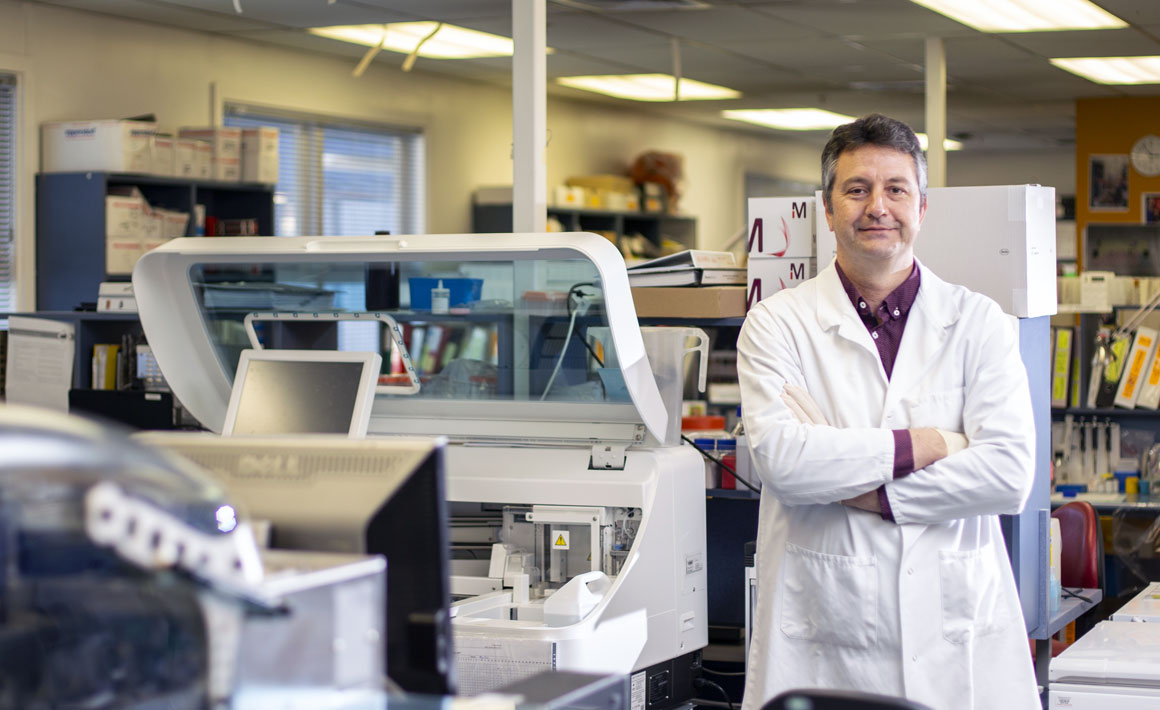 Associate Professor Chris Pemberton: “How much of the New Zealand population has been exposed to COVID? We suspect it will be far greater than the current number of confirmed RNA-based tests.”
Associate Professor Chris Pemberton: “How much of the New Zealand population has been exposed to COVID? We suspect it will be far greater than the current number of confirmed RNA-based tests.”A University of Otago, Christchurch team is developing a specialised test to help answer crucial questions needed to effectively plan for and treat COVID-19.
Antibodies are the body's first line of defence against a virus such as COVID-19. Their presence is also evidence the body has encountered the virus – and is the focus of a new government-funded study by University of Otago, Christchurch scientists.
Lead researcher Associate Professor Chris Pemberton says one of the best ways New Zealand can understand the real impact and future threat from COVID-19 is to know how much of the population has been exposed – or developed antibodies against it.
Pemberton and his team are developing a specialised test that will identify whether someone has contracted COVID-19 and how their body dealt with it. They will recruit and test 14,000 New Zealanders from ages 10 to 70 and from all regions of the country. These people will be followed over three years to gauge how they have responded to the virus infection.
“When a person has been exposed to a virus, they develop antibodies. There are two key types of antibodies that react to coronaviruses and infections in general, so our test will zero in on which of these are prominent or active.
“A second 'layer' of the test will identify proteins that are produced only by COVID-19 to 'invade' cells. This will ensure that the test is not picking up antibodies produced in response to other similar viruses like the common cold.
14,000
14,000 New Zealanders will be studied over three years to show an evolving immune-based picture of the virus and its behaviour.
“This aspect of the research is unique, and is possible because of the accumulated skills and experience of our team, including decades of experience in infectious disease management and developing test markers to assist clinical decision-making.
“A final feature of the testing regime is measuring whether the virus is still circulating in the system.”
Pemberton says the study will provide answers to the crucial questions government, health agencies and clinicians need in order to effectively plan for and treat COVID-19.
“One of these important questions is how much of the New Zealand population has been exposed to COVID? We suspect it will be far greater than the current number of confirmed RNA-based tests.
Another is how do different people deal with the virus such as, can people truly develop an immunity to it, how long does that immunity last and can they get COVID-19 again?''
Because the study will look at a wide range of New Zealanders and follow them over time, Pemberton says it will show an evolving immune-based picture of the virus and its behaviour.
It will look at not only what is going on inside the body, but how this matches up with their clinical presentation.
“We've all heard stories about asymptomatic patients with COVID-19. This study will identify those people who have the virus in their system, but do not develop symptoms or get a test. It will also track how they respond to, or fight off, the virus compared to those who had moderate or severe symptoms.”
One special feature of the research is that all the “ingredients” needed to develop and make the test are produced in New Zealand, Pemberton says. As well as supporting “NZ Inc” through a strategic partnership with SeraTec NZ Ltd, it means the study can continue even if borders remain closed and international supply chains are affected.
By late 2020 the researchers aim to have begun testing a significant number of participants.
Funding
Ministry of Business, Innovation and Employment
Cardiac context
Previous international research has suggested that people who have a viral infection are more susceptible to sudden cardiac events such as heart attacks in the weeks following their infection, and may be more likely to suffer another cardiac emergency compared with other patients.
For this reason Associate Professor Chris Pemberton and his team will examine the impact of COVID-19 on heart health as part of their Ministry of Business, Innovation and Employment-funded national antibody research.
They will identify those in their study of 14,000 New Zealanders who have pre-existing cardiac conditions and check if others develop problems during the research.
“We will be able to see the severity of disease in those who experienced COVID-19 and how it affects people's heart health during the three years of the study,'' Pemberton says. “We want to explore whether people who have a moderate to severe case of COVID experience cardiovascular issues later down the track.”
Pemberton say this aspect of the research will give government and health agencies insight into how the current COVID-19 crisis could put extra stress on the health system in future.